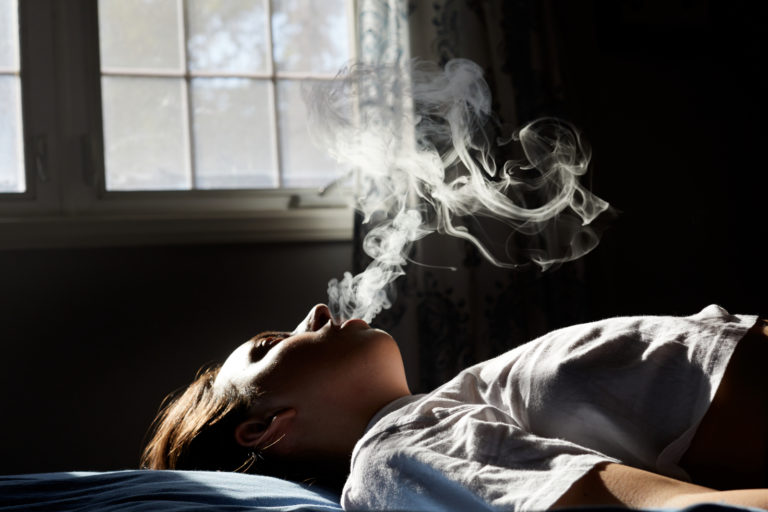Cannabis has been emerging as an alternative to anxiety medications, many of which come with unpleasant side effects. In this article, we'll delve into the research on cannabis and anxiety, hear from patients who have consumed marijuana to treat their anxiety, and learn what the experts have to say.
An overview of the research
When considering whether cannabis may be a useful tool in combating anxiety, the key is to distinguish between the two main cannabinoids in the plant and the different effects they have. According to Dr. Adie Rae, neuroscientist and scientific adviser to Weedmaps, “The top-two cannabinoids in cannabis, CBD and THC, when isolated from the plant appear to have opposite effects on anxiety. Namely, CBD has consistently been shown to reduce anxiety, whereas THC contributes to anxiety, in a dose-dependent fashion.”
Several studies support the notion that CBD may ease anxiety, whereas large amounts of THC could increase anxiety in certain individuals.
Studies on cannabis and anxiety
High-THC, low-CBD products may not be advisable for anxiety patients or anyone with mental health issues, according to the results of a randomized controlled trial published in 2013 in the Journal of Psychopharmacology. These results support the idea that CBD-dominant cannabis products may be the better option for treating anxiety.
In fact, a 2018 study published in the Journal of Affective Disorders showed that short-term medical cannabis treatment with products of a high-CBD, low-THC ratio resulted in a reduction of anxiety, as well as lowered stress and depression. Long-term medical cannabis use, however, may exacerbate depression in anxiety sufferers — Rae pointed out that the conditions are often comorbid. Specifically, almost 50% of people diagnosed with depression will also be diagnosed with an anxiety disorder.
 Photo by: Gina Coleman/Weedmaps
Photo by: Gina Coleman/WeedmapsImage lightbox

But the long-term outlook is not all bleak for anxiety patients seeking relief through cannabis. Some medical cannabis consumers may ultimately decrease their use of other anxiety treatments, according to research published in 2017 in the Journal of Psychopharmacology. Researchers indicated that some patients may substitute medical cannabis for opioids, while decreasing dependence on alcohol, sleep aids, anxiety medications, and antidepressants.
Medical cannabis patients share their stories
Lifestyle adjustments are another factor that can steer anxiety patients away from alcohol and other substances that often lead to dependencies. Dr. Melanie Bone, a board-certified OB-GYN and cannabis specialist elaborated, “I do believe that educating patients about the importance of a regular bedtime, consistent bedtime rituals such as cooling the bedroom, darkening the lights fully or not reading screens in bed, and not using alcohol at nighttime are all part of making cannabis work most effectively.”
Along with nurturing a nightly ritual of hibiscus tea and visualization meditation, 38-year-old Carol Altheimer integrates CBD-rich medical cannabis into her routine. Diagnosed with generalized anxiety disorder after the birth of her second child in 2018, Altheimer spoke with her physician about trying CBD upon experiencing adverse effects with a Xanax prescription.
“The Xanax not only made me dizzy during the day but also kept me awake at night,” Altheimer shared in a phone interview with Weedmaps. “After my doctor recommended CBD treatment, I almost immediately began to feel better, and I dumped the pill bottle in the garbage.”
Altheimer's consumption method of choice is CBD gummies, which she microdoses at two milligrams per candy. “It feels like I'm treating myself and I so look forward to my CBD gummies every evening. I've never slept better,” she said.
What the experts say about cannabis and anxiety
CBD gummies aren't the only kind of cannabis treatment that may reduce anxiety levels. Overall, in terms of the type of cannabis product to choose to address anxiety, the consensus again appears to pull away from those with high THC concentrations. Rae said, “It is highly likely that the panic and paranoia-inducing effects of cannabis are caused by THC, and they happen dose-dependently. That is, you're more likely to experience anxiety with either larger amounts of cannabis, or by consuming cannabis varieties that are more potent (higher THC).”
In other words, it may not be necessary to consume a pure CBD product but rather to limit the intake of THC. Rae continued, “Undoubtedly, choosing an inhalable cannabis product with a balance of CBD and THC is a very good strategy for avoiding feelings of panic and anxiety. It is unclear if oral, sublingual, or topical cannabis products with a healthy dose of CBD are effective for minimizing this unwanted effect.”
In terms of smokable products, choosing a high-CBD strain such as Charlotte's Web, AC/DC, or Sour Tsunami may be a viable option to help manage anxiety. Some anxiety patients have also reported positive outcomes with CBD oil, though research is still emerging and experiences will differ among individuals.
When deciding whether to integrate cannabis into a daily regimen to soothe anxiety, it is crucial to consult with your physician who will consider the entire picture of your health. Rae emphasized, “A person's baseline mental health is an important consideration when using cannabis. Small amounts, short-term, and infrequent use of cannabis (with a balanced ratio of THC:CBD) could be a good tool for a relatively healthy person experiencing situational anxiety.”
Major contributions from Dr. Adie Rae.

